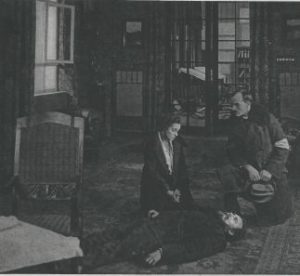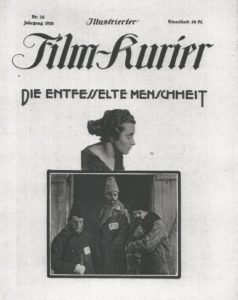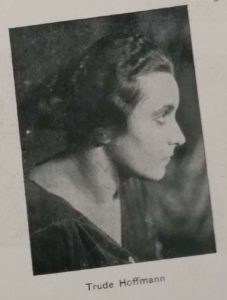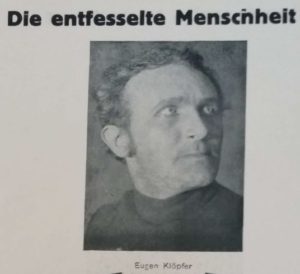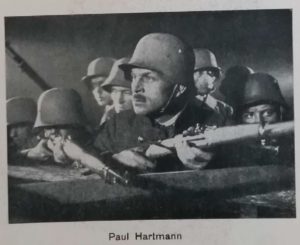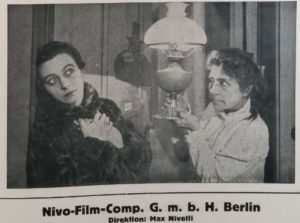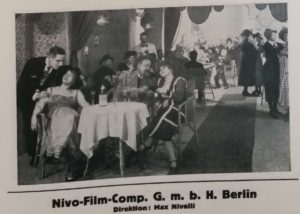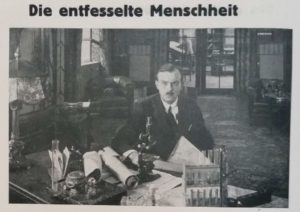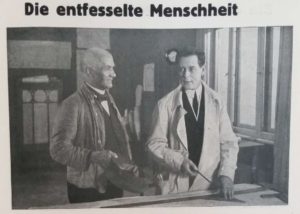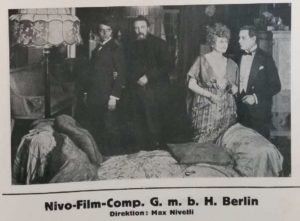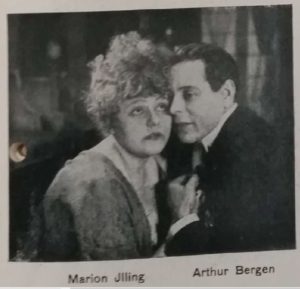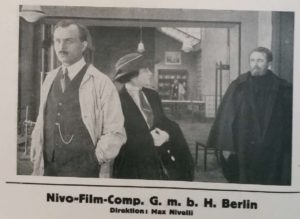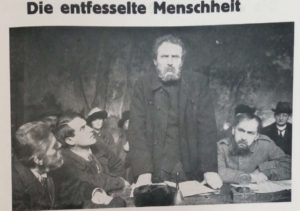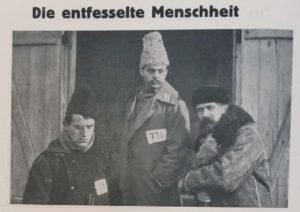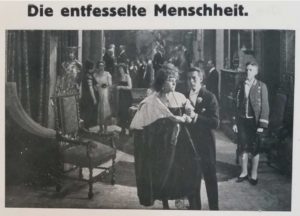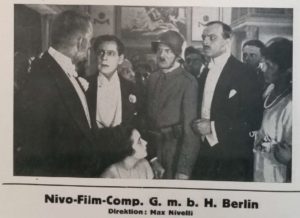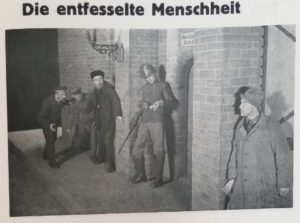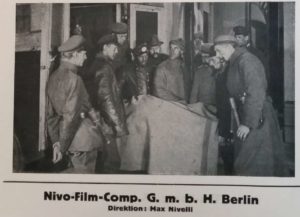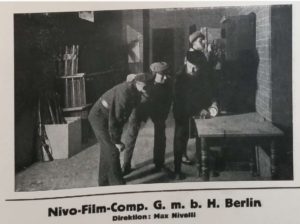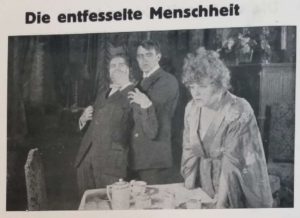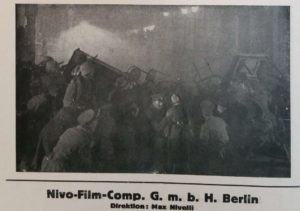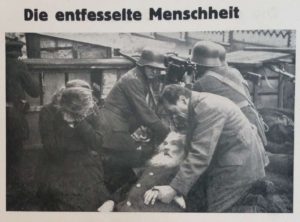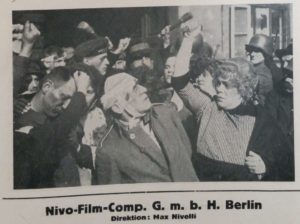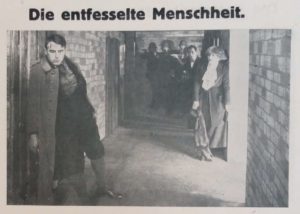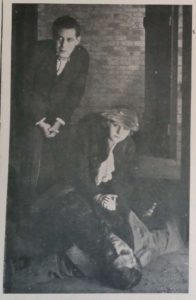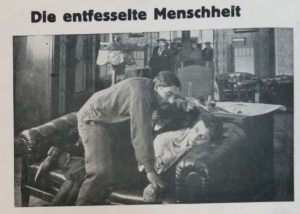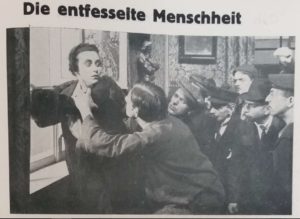Full Storyline
Based on the review published in the magazine “Der Film” (40), 1919, and the film program “Ritualmordet”, from the Norwegian National Library (Nasjonalbiblioteket).
A Cossack platoon arrives in a small village in the Russian Empire and lacking accommodations, forces the Jews of the village out of their houses in order to make room for the soldiers. In the process, Chaim Abramowitsch, the leader of the Jewish community, resists when he sees the soldiers mistreating his daughter Manja. He is about to be arrested, when to his rescue comes Sascha Mulnikow, a young student from a Christian Orthodox family of civil servants. 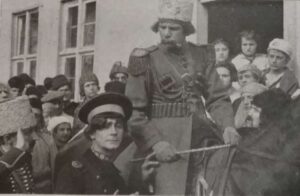 Sascha knows the Abramowitsch family as their neighbor and has been Manja’s childhood friend. He intervenes on his behalf and prevents his imprisonment. He then gives the family shelter at his mother’s house.
Sascha knows the Abramowitsch family as their neighbor and has been Manja’s childhood friend. He intervenes on his behalf and prevents his imprisonment. He then gives the family shelter at his mother’s house.
We learn that Sascha has always loved Manja but is nevertheless tormented for loving a Jew. As he tries to make sense of his feelings, he reads about the origins of false accusations against Jews, blaming them for ritual murders. Such racial hatred existed in Alexandria as early as the year 322, during the reign of Alexander the Great. In the following scenes, we see a similar story developing in Alexander’s court, involving Helena and Manetho the high-priest of Egypt.
Sascha has his own doubts but he also has to face criticism from his friends, Vera and Dimitri Vronskij, who are taunting him for his feelings for Manja. But, there are further complications – Vera is actually in-love with Sascha and wants him for herself, so she criticizes him for siding with the Jews. 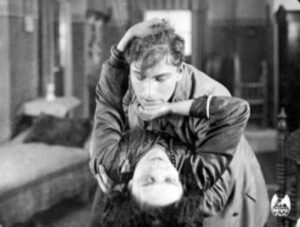 Dimitri, Vera’s brother, is himself attracted to the pure and shy Manja. Jealousy and disappointment stir up hate in the Vronskij siblings – at a party, they provoke their friends into insulting the young Jewish girl. Sascha leaves the party with Manja but she doesn’t mind the insult directed at her but instead worries that her loved ones have to suffer under the curse which is aimed at her people, saying: “When they hit me, they also strike them!”.
Dimitri, Vera’s brother, is himself attracted to the pure and shy Manja. Jealousy and disappointment stir up hate in the Vronskij siblings – at a party, they provoke their friends into insulting the young Jewish girl. Sascha leaves the party with Manja but she doesn’t mind the insult directed at her but instead worries that her loved ones have to suffer under the curse which is aimed at her people, saying: “When they hit me, they also strike them!”.
In the next scene, Sascha’s mother enters his room with the news that Sonja, Sascha’s youngest sister, has disappeared. All his friends gather to look for her, including Vera and Dimitri Vronskij, who now join him in his concern for the little girl. Whispers can already be heard: “The Jews…. it’s Passover!”, as rumors of ritual murder spread throughout the town.
The very same day that Sonja has disappeared, Chaim Abramowitsch took his children on a trip to the neighboring village Laioma to visit Petrus Czapka, the Polish innkeeper. Sascha, Vera and Dimitri, who have gone there to look for the little girl, are told by Waruschka, the innkeeper’s wife, that the last time she saw Sonja was in Chaim Abramowitsch’s arms. Sascha is shocked. He confronts Chaim Abramowitsch and to his horror finds the little girl’s bonnet in his possession. Abramowitsch declares his innocence in vain, while cries of murder resound through the alleys of the village. 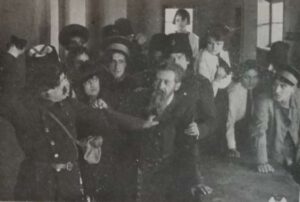 Police forces are on their way to take Chaim Abramowitsch into custody, but the mob is already storming the house of the community leader, driving him and his loved ones into the street to lynch them. At the last minute, the police arrive. Abramovitch is jailed, his wife and children escape and hide in a cellar.
Police forces are on their way to take Chaim Abramowitsch into custody, but the mob is already storming the house of the community leader, driving him and his loved ones into the street to lynch them. At the last minute, the police arrive. Abramovitch is jailed, his wife and children escape and hide in a cellar.
The raging crowd is unstoppable – all through the night the bloodbath continues in the Jewish quarter, Jews are dragged out and killed – an orgy of blood. Some fugitives flee into the synagogue, which soon goes up in flames, trapping the people inside. It is pure madness that screams toward heaven! 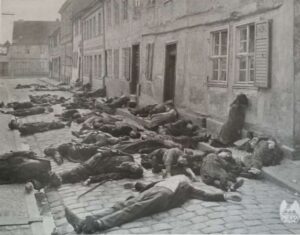
While the pogrom is raging outside, Sascha, who is highly distressed, locks himself in his room. He reads that the ritual-murder accusation has never been proven to be true and that the Jews have never committed this crime!
The next morning, the innkeeper finds little Sonja. While looking for berries, she was caught in a deer trap that he had set. He carries the girl to his home but he and his wife are afraid to go into town with the child in fear that they will be killed. Finally, Maruschka goes into town to seek advice with Vera and Dimitrij Vronskij, who stop her, saying: “As long as one of the Abramowitsches is still alive, Sonja may not be brought back…”.
They go on to incite the population to lynch Chaim Abramowitsch. As a murderer of a child, he will have to die in the presence of his wife and children. The mob storms the prison and demands that Abramovitch is released so they can kill him. The soldiers try to hold them back but the crowd continues to press on. Shots are fired and suddenly Dimitrij Vronskij falls down, deadly wounded. The soldiers retreat, while Vera throws herself sobbing over the body of her brother. At that moment, the mob breaks into the prison and grabs Chaim Abramovitch from his prison cell. He is placed against a wall and his wife and children are forced to watch. Stones are thrown towards him. With unimaginable power, Manja breaks free – she throws herself in front of her father to shield him with her own body. Stones are now flying at both father and daughter.
Meanwhile, Czapka the innkeeper is upset by the constant crying of little Sonja and without waiting for his wife to return, he takes the child in his little cart back to her parents’ home.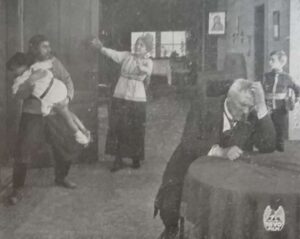 The joy of the family is boundless but while they are still celebrating Sonja’s return, a boy brings the news that the crowd is stoning Chaim Abramowitsch and his family.
The joy of the family is boundless but while they are still celebrating Sonja’s return, a boy brings the news that the crowd is stoning Chaim Abramowitsch and his family.
Sascha storms out into the street but arrives at the moment when Manja, already gravely wounded, collapses in front of her father. He shouts at the crowd: “Stop! You are killing innocent people. Sonja is alive!”. At that instance, arms are lowered and stones are dropped to the ground. Sascha kneels in front of Chaim Abramowitsch and his dying daughter. The hands of the tortured old Jew are raised towards heaven, as he says: “May this be an offering unto You, O Lord, when they have repented, but they have not reached that point yet.”
Sascha, with endless compassion and love, lifts Manja to his chest and with light in his eyes says: “It will be my task to preach for infinite love and help your poor people!”.
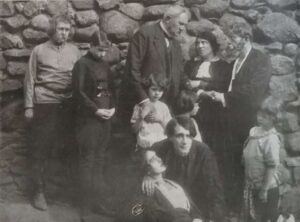
Some Press Reviews
- “At last an enlightenment film with artistic and moral justification… Hate and incitement to violence make the blood flow of incarcerated or persecuted Jews… We are not dealing here with an action emanating from sensationalist cinema fantasy, but events that we encounter every day on the pages of newspapers, artistically-recreated by director Joseph Delmont… all of these, slightly romanticized by the appeasing ending of the film…” Börsen-Zeitung am Mittag, 1919
- “A culture film of the highest order, a monumental work with rare qualities, scene after scene a masterpiece. Especially the mass scenes are exceptionally well done, from the entrance of the Cossacks to the Alexander scenes, right through to the scenes of the pogrom…” Berliner Börsenzeitung, 1919
- “…an enlightening film of the highest quality. Leonhard Haskel and Sybil Morel perform the leading roles with natural flair and without artificiality.” Morgenpost, 1919
- “…It leaves you spellbound, stunned and speechless. Joseph Delmont is excellent as the director in control of mass scenes, but also with much tenderness in his approach to the smallest scenes.” Acht Uhr Abendblatt, 1919
- “…this film is a cultural highlight. Artistically speaking, this film is a masterpiece. It was developed out of the conviction that one must fight against the growing delusion of ritual murder of Jews… This was the thought which led to the creation of this excellent work by Max Nivelli…” Nationalzeitung, 1919
- “This film has proved that the screen can enhance culture. It was a serious morning that brought an attentive audience to this drama, whose hero is not specifically a man but a nation.” Berliner Mittagszeitung, 1919
- “The whole production is a masterpiece… The highest praise should also be accorded to Nivelli, manager of the Nivo Film Company, the unpretentious father of this work.” Neue Berliner 12-Uhr Zeitung, 1919
- “…extremely interesting and very tense film…it was exceptionally well received… Nivo Film has sold its first monumental film… This is the first time that a film has conquered the world market after such a short period of only six weeks.” Kinematograph: Nr 679/80, 1919
- “This is one of the major new films, which points to a new direction of the German Film industry and which stands out as the one which would easily be able to compete with foreign films.” Der Film (42), 1919-10-19
- “The great Nivo-film Ritual Murder (The Outcasts) has been showing under the title Prejudice in the biggest movie theaters of New York for months… with such a success no other German film has been able to record so far.” Berliner Borsenzeitung (80), 1922-02-16
- “It is a simple story, rather complicated through the introduction of many characters, yet one which keeps to its argument with fairly convincing force… The atmosphere is well suggested, even though the players are inclined to display exaggerated emotions… Prejudice is certain to appeal in quarters where any persecution exists… It is certain to inspire charity and sympathy everywhere.” Motion Picture News, New York, 1922-02-04, p. 890
Full Cast
Abramowitch Family: Leonhard Haskel – Chaim Abramowitch, leader of the Jewish community; Rita Artz – Sarah, his wife; Sybil Morel – Manja, daughter; Heinz Seligmann (child) – Benjamin, son; Ruth Herz (child) – Ruth, daughter
Mulnikow Family: Wilhelm Diegelmann – Alexander Feodorowitsch Mulnikow, Clerk; Hella Tornegg – Anna, his wife; Alfred Abel – Sascha, son, student; K. J. Behn – Iwan, son, gymnasium student; Gertrud von Hoschek (child) – Sonja, daughter;
Vronskij Siblings: Wolfgang Heinz – Dimitrij Vronskij, student; Rita Clermont – Vera Vronskij, Dimitrij’s sister
Czapka Couple: Ludwig Rex – Petrus Czapka, Polish innkeeper; Rosa Valetti – Waruschka, Czapka’s wife
Fritz Richard – Veiteles, an old Jew
Harry Stolzmann – officer
The Court of Alexander the Great: Paul Meffert – Alexander the Great; Colette Corder – Helena, Alexander’s lover; Eugen Eisenlohr – Beistratos, a young Greek; Hermann Bachmann – Manetho, High-Priest of Egypt; Werner Stein – an old slave
<< Filmography >> Next Film
Photo Gallery
(click on any photo to start a slide show)
Die Geächteten – Der Ritualmord
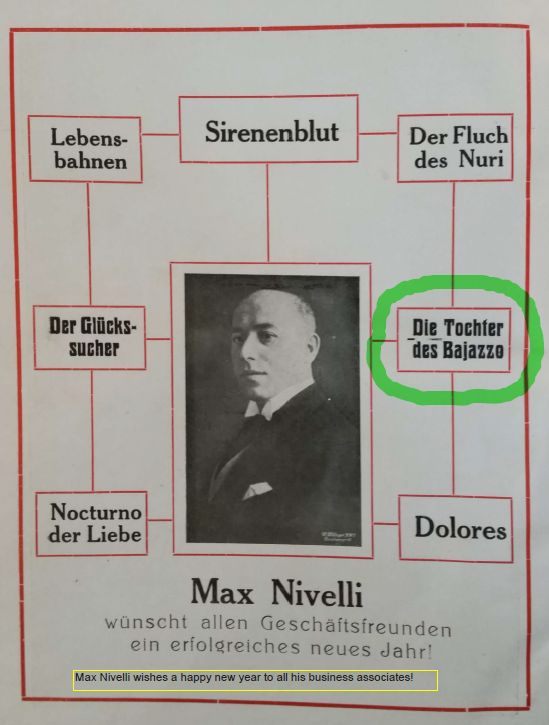
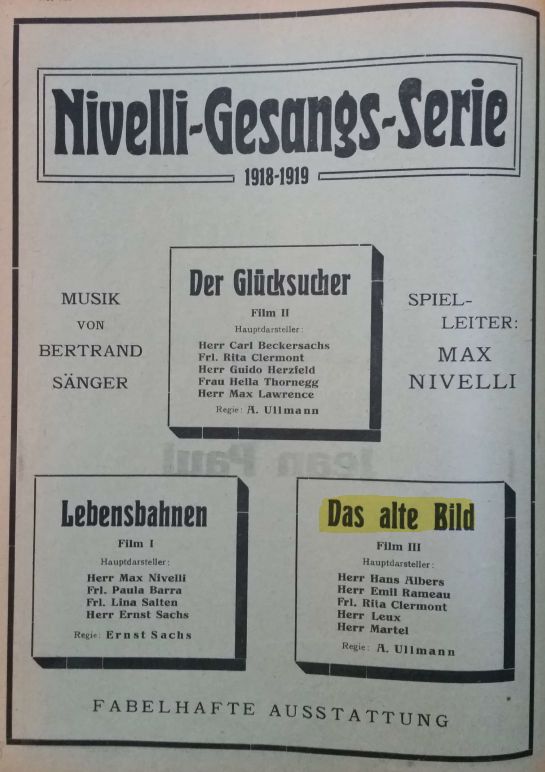
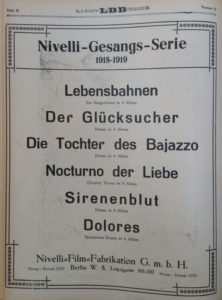
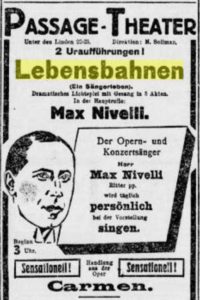
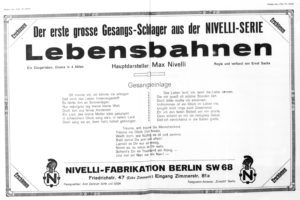
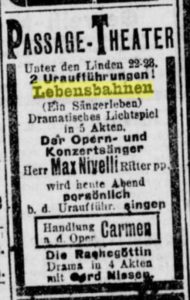
 Sascha knows the Abramowitsch family as their neighbor and has been Manja’s childhood friend. He intervenes on his behalf and prevents his imprisonment. He then gives the family shelter at his mother’s house.
Sascha knows the Abramowitsch family as their neighbor and has been Manja’s childhood friend. He intervenes on his behalf and prevents his imprisonment. He then gives the family shelter at his mother’s house. Dimitri, Vera’s brother, is himself attracted to the pure and shy Manja. Jealousy and disappointment stir up hate in the Vronskij siblings – at a party, they provoke their friends into insulting the young Jewish girl. Sascha leaves the party with Manja but she doesn’t mind the insult directed at her but instead worries that her loved ones have to suffer under the curse which is aimed at her people, saying: “When they hit me, they also strike them!”.
Dimitri, Vera’s brother, is himself attracted to the pure and shy Manja. Jealousy and disappointment stir up hate in the Vronskij siblings – at a party, they provoke their friends into insulting the young Jewish girl. Sascha leaves the party with Manja but she doesn’t mind the insult directed at her but instead worries that her loved ones have to suffer under the curse which is aimed at her people, saying: “When they hit me, they also strike them!”. Police forces are on their way to take Chaim Abramowitsch into custody, but the mob is already storming the house of the community leader, driving him and his loved ones into the street to lynch them. At the last minute, the police arrive. Abramovitch is jailed, his wife and children escape and hide in a cellar.
Police forces are on their way to take Chaim Abramowitsch into custody, but the mob is already storming the house of the community leader, driving him and his loved ones into the street to lynch them. At the last minute, the police arrive. Abramovitch is jailed, his wife and children escape and hide in a cellar.
 The joy of the family is boundless but while they are still celebrating Sonja’s return, a boy brings the news that the crowd is stoning Chaim Abramowitsch and his family.
The joy of the family is boundless but while they are still celebrating Sonja’s return, a boy brings the news that the crowd is stoning Chaim Abramowitsch and his family.
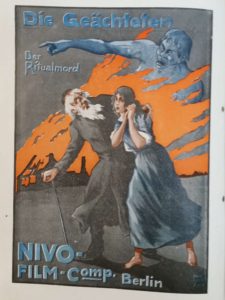
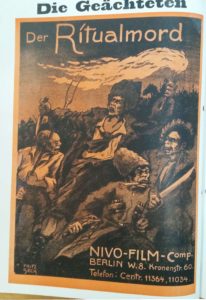
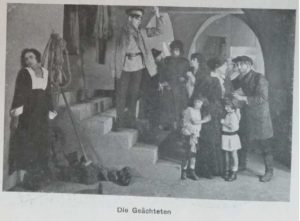
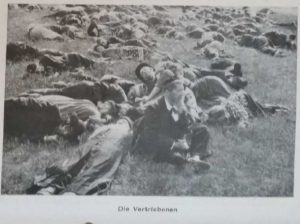
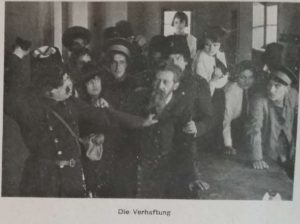
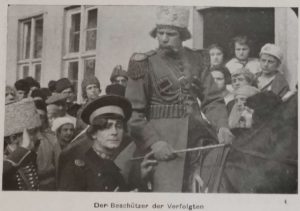
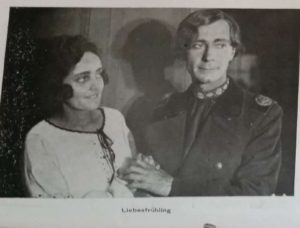
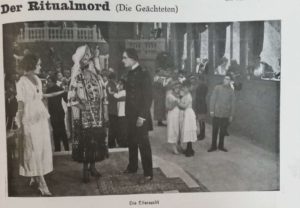
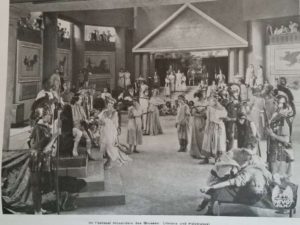
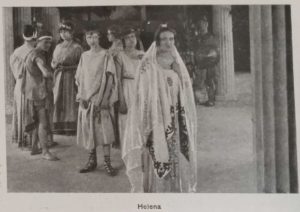
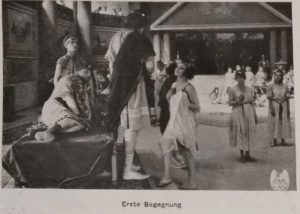
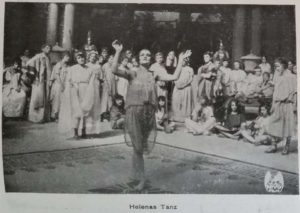
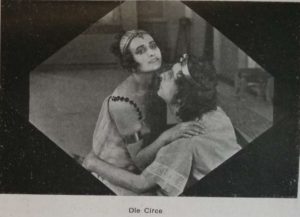
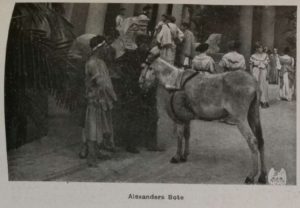
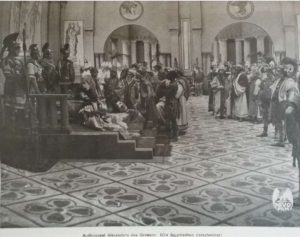
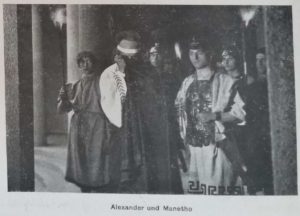
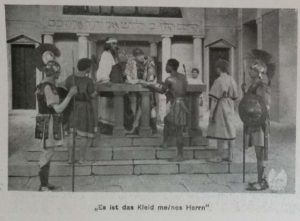
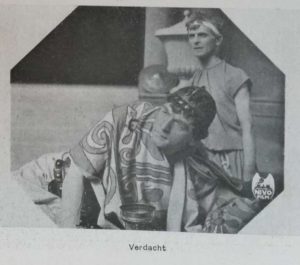
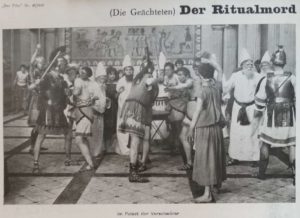
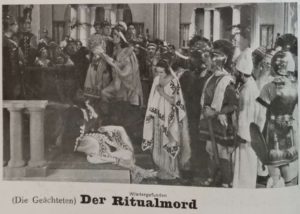
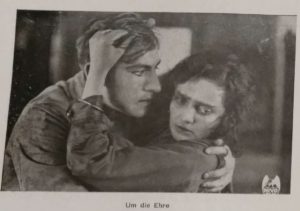
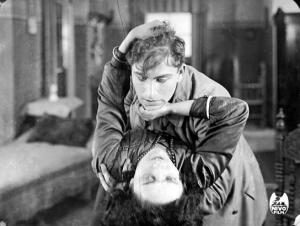
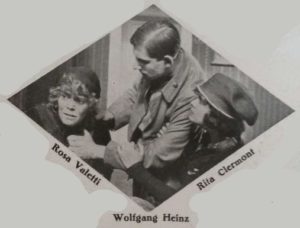
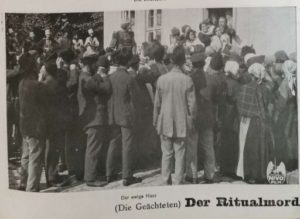
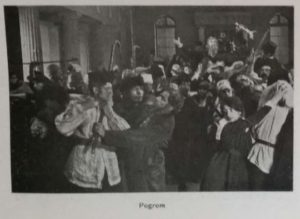
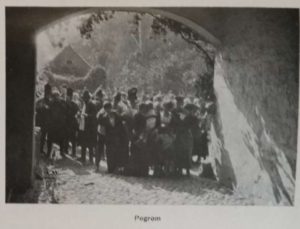
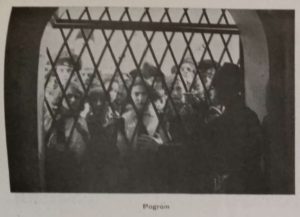
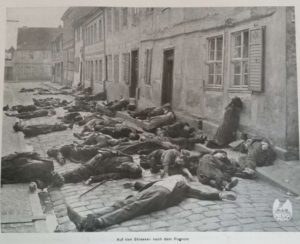
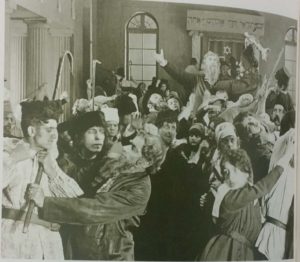
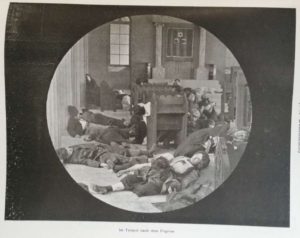
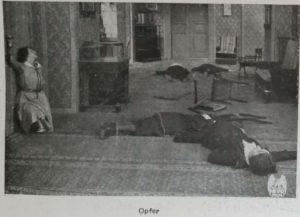
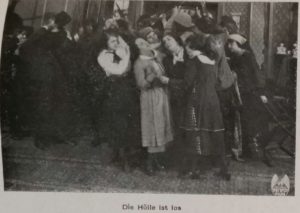
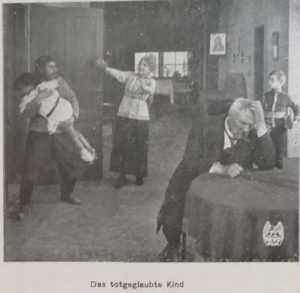
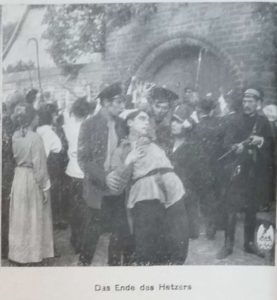
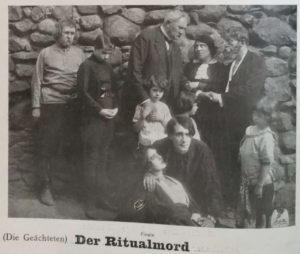
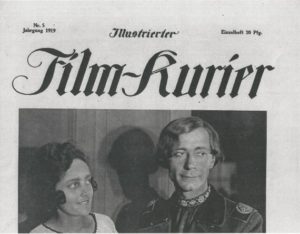
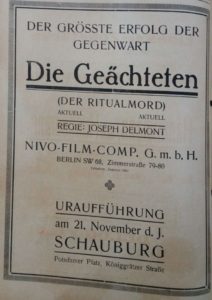
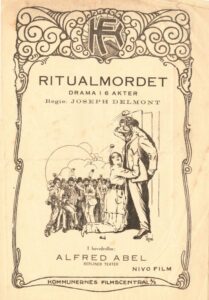
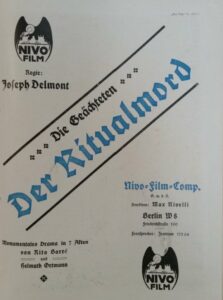
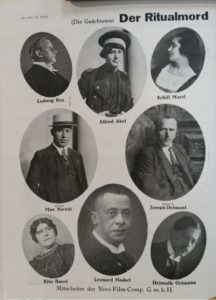
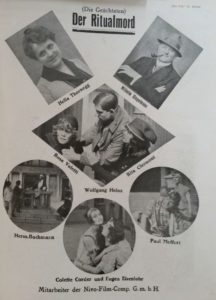
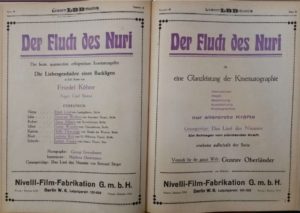
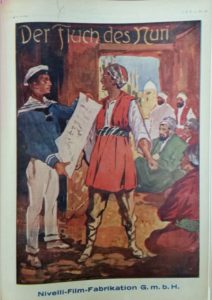
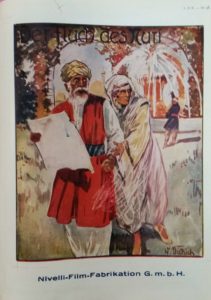
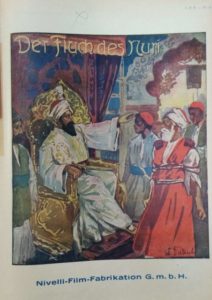
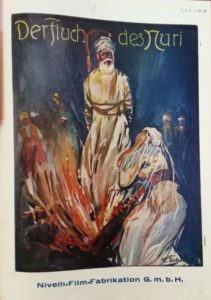
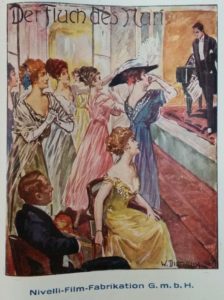
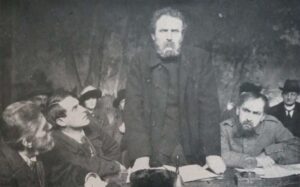 revolution. Following the revolution in Russia, the Bolsheviks release the German prisoners of war. Clarenbach returns to Berlin to reunite with Rita and resume his work as director of a chemical factory. Shortly afterward, the German Republic is declared and the war comes to an end. Clarenbach meets with Winterstein who spreads Karenow’s revolutionary ideas in Berlin. With Winterstein’s help, Karenow has gathered a group of conspirators willing to use violence.
revolution. Following the revolution in Russia, the Bolsheviks release the German prisoners of war. Clarenbach returns to Berlin to reunite with Rita and resume his work as director of a chemical factory. Shortly afterward, the German Republic is declared and the war comes to an end. Clarenbach meets with Winterstein who spreads Karenow’s revolutionary ideas in Berlin. With Winterstein’s help, Karenow has gathered a group of conspirators willing to use violence.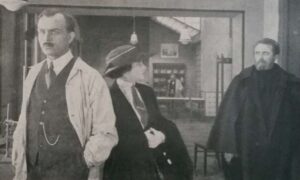 fertilizer. Out of blood and distress, the new will rise! …. the whole fabric of the world has to be destroyed and broken into pieces in order that we shall construct a more beautiful and brighter building upon the rubble”. Unlike Karenow, Clarenbach believes in order and honest labor, which in turn will bring prosperity. He successfully appeals to the striking workers in his factory, to work collectively for a better future. But Karenow, driven by his hatred to Clarenbach, elicits the cooperation of Clarenbach’s wife, who feels neglected by her husband. Rita is drawn to Karenow’s mysterious powers and his revolutionary ideas.
fertilizer. Out of blood and distress, the new will rise! …. the whole fabric of the world has to be destroyed and broken into pieces in order that we shall construct a more beautiful and brighter building upon the rubble”. Unlike Karenow, Clarenbach believes in order and honest labor, which in turn will bring prosperity. He successfully appeals to the striking workers in his factory, to work collectively for a better future. But Karenow, driven by his hatred to Clarenbach, elicits the cooperation of Clarenbach’s wife, who feels neglected by her husband. Rita is drawn to Karenow’s mysterious powers and his revolutionary ideas.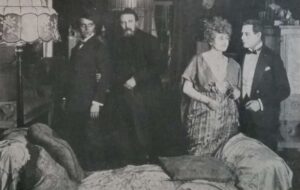 Meanwhile, Winterstein follows Karenow’s orders to use his mistress Camilla into seducing the young and innocent Turenius, whose father owns a large ammunition factory. Through Camilla, the conspirators get hold of the keys to the ammunition depot and blow up the factory. Clarenbach suspects Karenow and goes to his apartment where, to his surprise, he finds his wife instead of Karenow. Rita has warned Karenow and he had left.
Meanwhile, Winterstein follows Karenow’s orders to use his mistress Camilla into seducing the young and innocent Turenius, whose father owns a large ammunition factory. Through Camilla, the conspirators get hold of the keys to the ammunition depot and blow up the factory. Clarenbach suspects Karenow and goes to his apartment where, to his surprise, he finds his wife instead of Karenow. Rita has warned Karenow and he had left.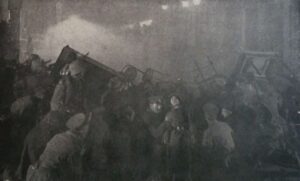 The conspirators further provoke the workers and their sympathizers – they hold mass gatherings and initiate strikes that escalate into an uprising. Joined by criminals and prostitutes, they take up arms, set up street barricades and seize houses. Street fights break out. The rebels resist the intervention of government troops and the newly formed squads which Clarenbach has gathered. Finally, the rebels are defeated, Winterstein dies and the troops are in pursuit of Karenow. As he flees by Clarenbach’s factory, he sees a mob of furious workers threatening Rita. Karenow saves her but he himself is killed. As they look over his dead body, Clarenbach and Rita reconcile as Clarenbach says: “His will was pure, but his way was wrong. When he died, he must have been horrified by the consequences of his own propaganda. The time has come to start working”.
The conspirators further provoke the workers and their sympathizers – they hold mass gatherings and initiate strikes that escalate into an uprising. Joined by criminals and prostitutes, they take up arms, set up street barricades and seize houses. Street fights break out. The rebels resist the intervention of government troops and the newly formed squads which Clarenbach has gathered. Finally, the rebels are defeated, Winterstein dies and the troops are in pursuit of Karenow. As he flees by Clarenbach’s factory, he sees a mob of furious workers threatening Rita. Karenow saves her but he himself is killed. As they look over his dead body, Clarenbach and Rita reconcile as Clarenbach says: “His will was pure, but his way was wrong. When he died, he must have been horrified by the consequences of his own propaganda. The time has come to start working”.